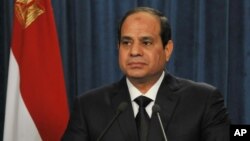Egyptian President Abdel Fattah el-Sissi told his countrymen, in a televised national address late Sunday, that Egypt is hoping to be part of a new Arab joint defense force, which is now under consideration by the Arab League.
Sissi insisted Egypt has always sought to defend itself “from inside its own borders,” without intentionally aggressing its neighbors. He defended his military action in neighboring Libya, saying 13 terrorist sites were attacked in retaliation for the beheading of 21 Coptic Christians by Islamic State militants.
He insists Egypt's army does not attack any country or invade its land. Recently, and until now, he says Egypt has defended its territory without leaving its borders.
The Egyptian leader also brought up the topic of putting together a joint Arab defense force, a subject that was discussed at last week's meeting of Arab League foreign ministers.
He says the need for a unified Arab force is growing and becoming more pressing every day due to the challenges the region is facing. He added the region will be able to overcome such challenges when it unites.
Both the United Arab Emirates and Jordan have expressed support for Egypt during the recent conflict in Libya and the killings of its citizens. But Qatar criticized the Egyptian airstrikes in Libya and has been at loggerheads with Egypt's military-backed government since the ouster of Islamist President Mohamed Morsi in July 2013.
Al Hayat newspaper recently noted a joint Arab defense pact already exists, dating back to 1950. A number of Arab states have fought alongside Egypt in its conflicts with Israel. Egypt also participated in the 1991 Gulf War to liberate Kuwait.
American University of Beirut political science Professor Hilal Khashan says all previous efforts of Arab states to form a joint military force since 1948, “on the eve of the Palestine War [which led to the creation of Israel] have failed.”
But Khashan points out Saudi Arabia's new King Salman has been pondering the formation of a “joint Sunni force,” including Egypt and its arch-rival Turkey.
“The new Saudi King Salman, in his bid to open up to the [Muslim] Brotherhood, has been applying pressure on [President] Sissi to resolve his conflicts with the Brotherhood so that relations between Turkey and Egypt can be improved. Salman wants to create a Sunni [Arab] force, consisting of Saudi Arabia, Jordan, Egypt, and Turkey,” said Khashan.
Given the current tensions between Egypt and Turkey, which is now home to a number of Egyptian Muslim Brotherhood leaders, the probability of forming such a force is questionable.




